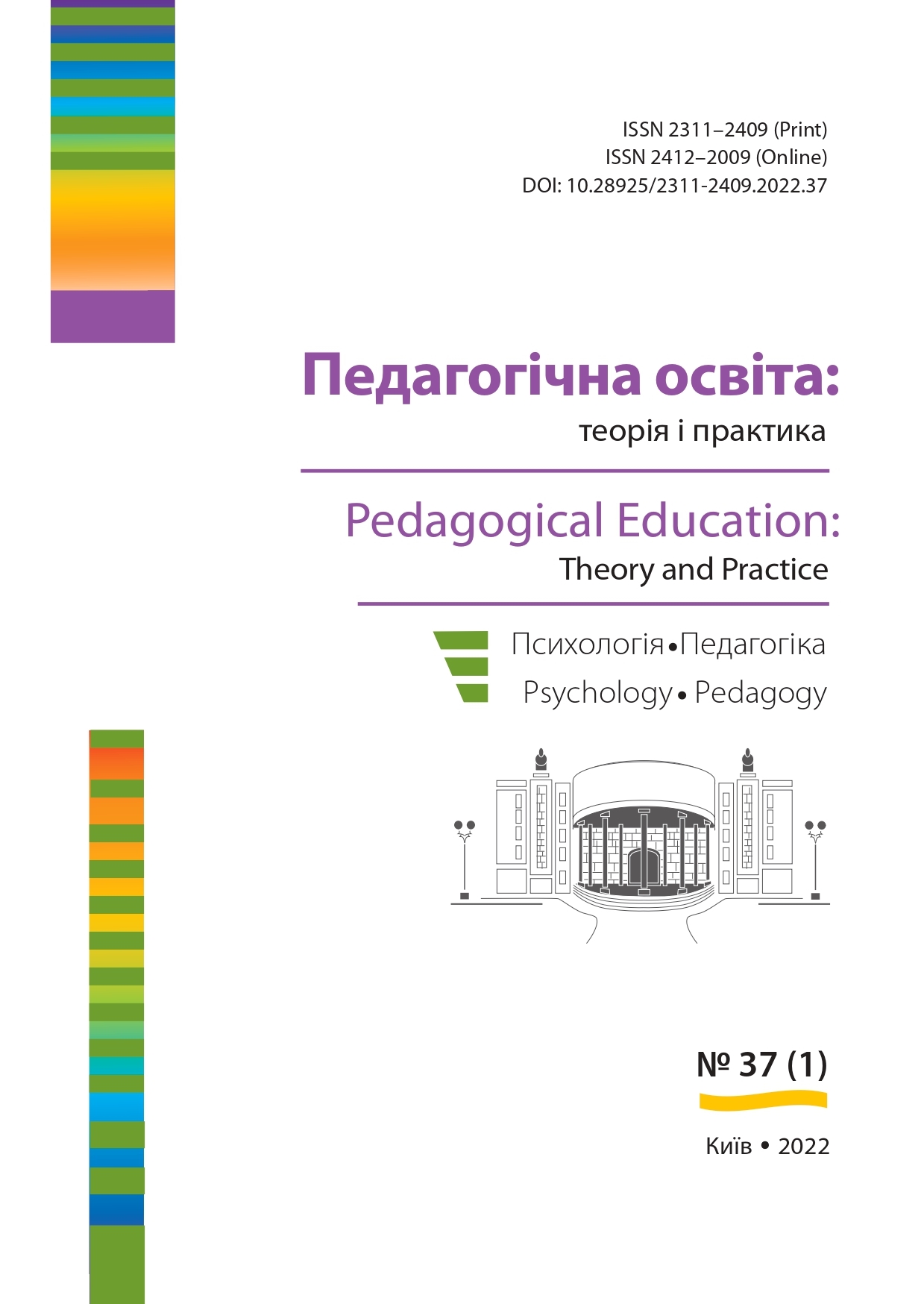Саморегуляція особистості як умова формування лідерських якостей майбутнього педагога
DOI:
https://doi.org/10.28925/2311-2409.2022.379Анотація
У статті досліджуються особливості саморегуляції особистості, оскільки динамічне сьогодення
висуває високі вимоги до особистісного розвитку сучасної молоді. Сучасні соціально-економічні
процеси в нашому суспільстві висувають підвищені вимоги до особистісних та професійних якостей фахівців таких важливих областей практики, як управлінська, науково-педагогічна, педагогічна, юридична, медична, психологічна тощо.
В умовах розбудови і оновлення педагогічної освіти особливо актуальною постає проблема становлення особистості вчителя. Один з шляхів вирішення цієї проблеми — повернення національної освіти до гуманістичних джерел.
Оскільки вчитель є найважливішою постаттю в системі освіти, саме гуманістична спрямованість в структурі особистості педагога дає змогу розгорнути суб’єкт-суб’єктні відносини
між учасниками освітнього процесу. Проблема суб’єкт-суб’єктної взаємодії особливо актуалізується в системі вищої освіти, яка є першою сходинкою у професіоналізації особистості молодої людини — студента/студентки. Як свідчить практика, сьогоднішні першокурсники в переважній більшості вісімнадцятилітті юнаки та юнки, які змінили соціальний статус та умови
життя. Доведено, що перехід до дорослого життя дуже складний і суперечливий. Колізії особистісного становлення нелегкі, сповненні протирічь, пошуків сенсів, умотивованому виборі професії та опанування професійними компетентностями. Оволодіння педагогічною професією обумовлюється мотивацією студента, його психологічною готовністю до педагогічної діяльності,
свідомим намаганням самореалізуватися в професії.
До соціально значимих мотивів педагогічної діяльності науковці відносять: відповідальність за виховання дітей; захоплення і задоволеність від взаємодії з дітьми; усвідомлення високої місії педагога.
62 Педагогічна освіта: теорія і практика. Психологія. Педагогіка
Pedagogical Education: Theory and Practice. Psychology. Pedagogy
Зазначимо, що соціально цінні мотиви педагогічної діяльності яскраво виражені в освітньо-професійному процесі і охоплюють опанування студентами педагогічної, соціально-культурної
та науково-дослідницької діяльності. за наявності такої мотивації процес навчання майбутнього педагога стає найбільш ефективним і, вірогідніше за все, що здобувши професійну кваліфікацію, вони будуть реалізовувати набуті компетентності у галузі освіти.
Завантаження
Посилання
Borys I. Palamar, Halyna O. Vaskivska, Svitlana P. Palamar. (2017). Didacticaspects of cognition
of human as a bio-psycho-socio-cultural personality. // Wiadomości Lekarskie.; LXX nr 5: 959-963.
Cameron, L. D. & Leventhal, H. (2003). Self-regulation, health and illness: An overview. In L.D. Cameron
and H. Leventhal (Eds), The Self-regulation of Health and Illness Behaviour. London: Routledge, P. 1-13.
D. de Ridder, J. de Wit (eds.) (2006) Self-regulation in Health Behavior. London: John Wiley & Sons.
Halyna O. Vaskivska, Svitlana P. Palamar, Olha M. Vlasenko. (2019). Нealth in
Kuhl, J. (1996). Who controls whom when “I control myself?” // Psychological-Inquiry.; Vol 7(1).
P. 61-68.
Rosenberg, M. (1965) Society and the Adolescent Self-Image. Princeton.
Savchenko, Yu. Yu., Bulana, L. V. (2019). Simia yak chynnyk stanovlennia psykholohichnoi stati
doshkilnyka [Family as a factor in the formation of the psychological sex of the preschooler]. New stages
of development of modern science in Ukraine and EU countries: monograph, 429-446 (in Ukrainian).
Self-regulation in Health Behavior (2006). / Eds. D. de Ridder, J. de Wit. London: John Wiley & Sons.
Svitlana Palamar, Nataliya Golota, Maryna Mashovets. (2019). Formation of leadership qualities
of future teachers of primary school in professional preparation. // Advances in Social Science, Education
and Humanities Research. Published by Atlantis Press SARL (359), 216-220. ISSN 2352-5398.
Viktoria Zhelanova, Svitlana Palamar, Maryna Yepikhina. (2019). Leadership Qualities of a Modern
University Student in the Reflexive Dimension. // Advances in Social Science, Education and Humanities
Research. Published by Atlantis Press SARL (368).; 102-108. ISSN 978-94-6252-870-3.
Zaccaro, S. J. (2001). The nature of executive leadership: A conceptual and empirical analysis of success.
Washington, D. C.: American Psychological Association.
Zimmerman, B. J. (2000). Attaining Self-Regulation: A Social Cognitiv Respective. In M. Boekaerts,
P.R. Pintrich, & M. Zeidner, Handbook of Self-Regulation. San Diego:Academic Press, P. 13-35.
Пов’якель, Н. І. (2003). Професіогенез саморегуляції мислення практичного психолога. Київ.
Савченко, Ю. Ю., Поліщук, В. М., Ільїна, Н. М., Поліщук, С. А., Мисник, С. О., Рябко, Ю. В.,
Шейко, Г. Д. (2021). Психологія сім`ї. Університетська книга. ISBN 978-966-680-985-1
REFERENCES
Borys I. Palamar, Halyna O. Vaskivska, Svitlana P. Palamar. (2017). Didacticaspects of cognition
of human as a bio-psycho-socio-cultural personality. Wiadomości Lekarskie. vol. LXX, no. 5, pp. 959-963.
[in English]
Cameron L.D. & Leventhal H. (eds) (2003). Self-regulation, health and illness behaviour. London:
Routledge. [in English]
D. de Ridder, J. de Wit (eds.) (2006) Self-regulation in Health Behavior. London: John Wiley & Sons.
[in English]
Halyna O. Vaskivska, Svitlana P. Palamar, Olha M. Vlasenko. (2019). Нealth in the civic students` value
system: empirical analysis. Wiadomości Lekarskie. vol. LXXII, no. 10, pp. 1947-1952. [in English]
Kuhl J. (1996). Who controls whom when “I control myself?” Psychological Inquiry. Vol 7(1), pp. 61-68.
[in English]
Rosenberg M. (1965) Society and the Adolescent Self-Image, Princeton: Princeton University Press.
[in English]
Savchenko Yu.Yu., Bulana L.V. (2019). Simia yak chynnyk stanovlennia psykholohichnoi stati doshkilnyka
[Family as a factor in the formation of the psychological sex of the preschooler]. New stages of development
of modern science in Ukraine and EU countries: monograph, Riga: Baltia Publishing, pp. 429-446
[in English]
Self-regulation in Health Behavior (2006). / Eds. D. de Ridder, J. de Wit. London: John Wiley & Sons.
[in English]
Svitlana Palamar, Nataliya Golota, Maryna Mashovets. (2019). Formation of leadership qualities
of future teachers of primary school in professional preparation. Advances in Social Science, Education and
Humanities Research. Vol. 359, pp. 216-220. [in English]
Viktoria Zhelanova, Svitlana Palamar, Maryna Yepikhina. (2019). Leadership Qualities of a Modern
University Student in the Reflexive Dimension. Advances in Social Science, Education and Humanities
Research. Vol. 368, pp. 102-108. [in English]
Zaccaro S.J. (2001). The nature of executive leadership: A conceptual and empirical analysis of success,
Washington, D.C.: American Psychological Association. [in English]
Zimmerman B.J. (2000). Attaining Self-Regulation: A Social Cognitiv Respective Handbook of SelfRegulation (eds. M. Boekaerts, P.R. Pintrich, & M. Zeidner), San Diego: Academic Press, pp. 13-35.
[in English]
Poviakel, N. I. (2003). Profesiohenez samorehuliatsii myslennia praktychnoho psykholoha. [Professional
genesis of self-regulation thinking of a practical psychologist]. Kyiv. [in Ukrainian]
Savchenko Yu.Yu., Polishchuk V.M., Ilina N.M., Polishchuk S.A., Mysnyk S.O., Riabko Yu.V., Sheiko
H.D. (2021). Psykholohiia sim`yi [Family psychology]. Sumy: Universytetska knyha. [in Ukrainian]

